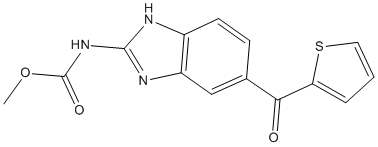All AbMole products are for research use only, cannot be used for human consumption.

Nocodazole is an anti-microtubule agent for ABL, ABL (E255K) and ABL (T315I) with IC50 of 0.21 μM, 0.53 μM and 0.64 μM, respectively. Nocodazole is a high-affinity ligand for the cancer-related kinases including ABL phosphorylated, c-KIT, BRAF, and MEK with Kd of 0.091 μM, 1.6 μM, 1.8 μM and 1.6 μM, respectively. In addition, the Kd of Nocodazole for ABL (E255K) phosphorylated, ABL (T315I) phosphorylated, BRAF (V600E) and PI3Kγ is 0.12 μM, 0.17 μM, 1.1 μM and 1.5 μM, respectively. Nocodazole induces apoptosis in chronic lymphocytic leukemia cells. Nocodazole inhibits insulin-stimulated glucose transport. Nocodazole decreases apoptosis in some human colon carcinoma cells. Nocodazole impairs the morphology and directionality of migrating medial gan-glionic eminence cells. At high concentrations, nocodazole rapidly depolymerizes microtubules in cells, while low concentrations of nocodazole inhibit microtubule dynamic instability. Mitotic cells incubated with different concentrations of paclitaxel are inhibited from progressing to G1 phase 6 hours after release from the nocodazole block, with a median inhibitory concentration of 4 nM. Nocodazole-pretreated cells exposed to paclitaxel in the absence of nocodazole only form free-floating microtubules, whereas pretreated cells exposed to paclitaxel in the presence of nocodazole-assembled centrosome organize microtubules. Nocodazole disrupts microtubules by binding to β-tubulin. Nocodazole prevents the formation of one of the two interchain disulfide linkages. Nocodazole impairs the transport of vesicles. Nocodazole suppress METH-induced cell death and lysosomal dysfunction. METH-induced cell death is significantly decreased by Nocodazole pretreatment in comparison to METH alone. The tumor volume and tumor weight of the mice treated with Ketoconazole plus Nocodazole are significantly reduced as compared with those treated with Ketoconazole or Nocodazole alone. Combined treatment with Ketoconazole plus Nocodazole strongly enhances apoptosis of COLO 205 tumor xenografts treated with Ketoconazole or Nocodazole alone. The tumor volume and tumor weight of the mice treated with Ketoconazole plus Nocodazole are significantly reduced as compared with those treated with Ketoconazole or Nocodazole alone. Combined treatment with Ketoconazole plus Nocodazole strongly enhances apoptosis of COLO 205 tumor xenografts treated with Ketoconazole or Nocodazole alone.

Cancer Gene Ther. 2025 May 20; .
Pan-cancer oncogenic properties and therapeutic potential of SF3B4
Nocodazole purchased from AbMole

J Virol. 2025 Feb 05.
The Japanese encephalitis virus NS1 protein concentrates ER membranes in a cytoskeleton-independent manner to facilitate viral replication
Nocodazole purchased from AbMole

Nat Commun. 2024 Apr 3;15(1):2890.
Dbf4-dependent kinase promotes cell cycle controlled resection of DNA double-strand breaks and repair by homologous recombination
Nocodazole purchased from AbMole

J Virol. 2024 Apr 24.
Japanese encephalitis virus NS1 and NS1’ proteins induce vimentin rearrangement via the CDK1-PLK1 axis to promote viral replication
Nocodazole purchased from AbMole

Mol Cell. 2023 Mar 8;S1097-2765(23)00113-2.
Sequence and chromatin features guide DNA double-strand break resection initiation
Nocodazole purchased from AbMole

Elife. 2023 Jun 30;12:e84322.
Long-range DNA end resection supports homologous recombination by checkpoint activation rather than extensive homology generation
Nocodazole purchased from AbMole

Nat Methods. 2022 Mar;19(3):331-340.
Efficient targeted insertion of large DNA fragments without DNA donors
Nocodazole purchased from AbMole
| Cell Experiment | |
|---|---|
| Cell lines | |
| Preparation method | |
| Concentrations | |
| Incubation time | |
| Animal Experiment | |
|---|---|
| Animal models | Nude mice with COLO-205 tumor xenografts |
| Formulation | 0.05% dimethyls |
| Dosages | 5 mg/kg |
| Administration | Administered via i.p. |
| Molecular Weight | 301.32 |
| Formula | C14H11N3O3S |
| CAS Number | 31430-18-9 |
| Solubility (25°C) | DMSO 12 mg/mL |
| Storage |
Powder -20°C 3 years ; 4°C 2 years In solvent -80°C 6 months ; -20°C 1 month |
[1] Arif A Surani, et al. Optimizing Cell Synchronization Using Nocodazole or Double Thymidine Block
[2] S M Attia, et al. Dominant lethal effects of nocodazole in germ cells of male mice
| Related Src-bcr-Abl Products |
|---|
| KX2-361
KX2-361 (KX-02) is a Src-kinase and tubulin polymerization inhibitor. KX2-361 shows anti-tumor activity and induces apoptosis of Glioblastoma (GBM) cell. KX2-361 shows good oral bioavailability and readily crosses the BBB in mice. |
| Risvodetinib
Risvodetinib (IkT-148009) is an orally active, selective and brain-penetrant protein tyrosine kinase inhibitor, displaying excellent target efficacy against c-Abl1, c-Abl2/Arg with IC50 values of 33 nM, 14 nM, respectively. |
| SI-2 hydrochloride
SI-2 hydrochloride is a highly promising SRC-3 inhibitor (PPI) with acceptable oral availability, with IC50 values of 3-20 nM for breast cancer cell death. |
| KB SRC 4
KB SRC 4 is a potent, and highly selective c-Src inhibitor, with a Ki of 44 nM and a Kd of 86 nM, and shows no inhibition on c-Abl up to 125 μM; KB SRC 4 has antitumor activity. |
| Hydroxymethyl dasatinib
Hydroxymethyl dasatinib (M24), a benzylhydroxy metabolite of Dasatinib, exhibits an IC50 of 46.7nM in K562 CML cells. |
All AbMole products are for research use only, cannot be used for human consumption or veterinary use. We do not provide products or services to individuals. Please comply with the intended use and do not use AbMole products for any other purpose.


Products are for research use only. Not for human use. We do not sell to patients.
© Copyright 2010-2024 AbMole BioScience. All Rights Reserved.
